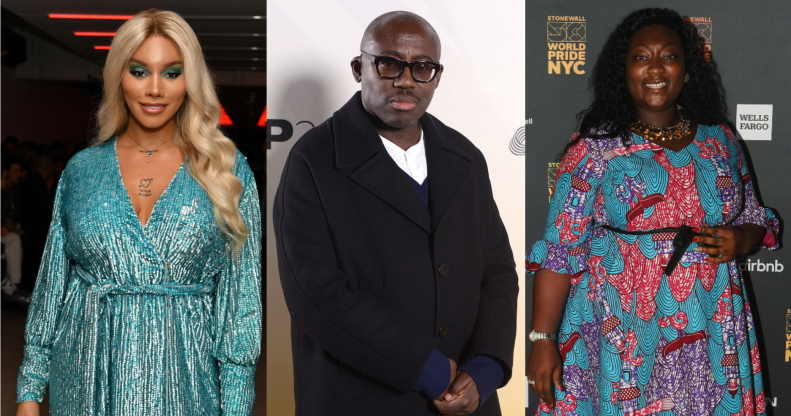LGBT+ titans Munroe Bergdorf, Edward Enninful and Lady Phyll named among ‘100 great Black Britons’

Munroe Bergdorf, Edward Enninful and Lady Phyll. (Getty)
Model and trans activist Munroe Bergdorf, British Vogue editor Edward Enninful and UK Black Pride co-founder Lady Phyll are on a list of ‘100 Great Black Britons’ celebrating the achievements of Black British people over the past 400 years.
The three LGBT+ icons are on the list of 100 Great Black Britons, which is part of a campaign by Windrush campaigner Patrick Vernon OBE and historian Dr Angelina Osborne to celebrate the lives, stories and contribution of Black British people.
A book of the same name was published today to mark the beginning of Black History Month, after the public was invited to vote for the Black British people they most admire. The book highlights the top 100 people, along with portraits and an exploration of their contribution to Britain, who were chosen by a panel of experts in January from thousands of nominations.
Osborne said: “The book is for everybody, it’s about informing and educating everybody. I think it’s always been unacceptable to us to be at school or in education not having black British history included in the curriculum.
“People often aren’t having their questions answered as to why people of African and Caribbean heritage are here, no one’s giving a meaning to our presence.
“Our book is just really a jumping point. People can read about the individuals, particularly the historical figures and say: ‘There must be more, of course there’s more, I would like to learn more about those people’.'”
A GoFundMe campaign has been launched to send a copy of the book to every UK secondary school.
This year’s list comes 16 years after a 2003/04 initiative, which listed Black British people and their achievements for the first time.
Vernon said that he and Osborne were moved to recreate the list and write the accompanying book after the Windrush scandal, Grenfell Tower fire and growing intolerance in the UK after the Brexit vote.
Vernon said: “There’s a key golden thread in the vast majority of the biographies that are covered in the book in that all the people never gave up, they struggled, whatever field they were in, or discipline or time period in history, they were ahead of the game and they never gave up.
“If that can inspire young people around our own personal goals, achievement and fighting for equality in Britain and learning and educating then I think that would be a fantastic legacy.”
Asked by The Guardian whether things had improved for black Britons since the list was last compiled, he said: “It depends what metrics you are using. If you are talking about individual achievements, in the book we are celebrating people that we covered back in 2003-04, but there are new heroes that have been recognised – Lewis Hamilton wasn’t around in 2003-04, neither was Stormzy.
“But if you were to look at other metrics – inequalities in health, education, stop and search, things have not improved dramatically in many ways. We’re still fighting for our rights in this country. And that’s why we still have Black History Month and these publications.”
He added that the list could easily have been of 1,000 Black Britons based on the number of nominations.

